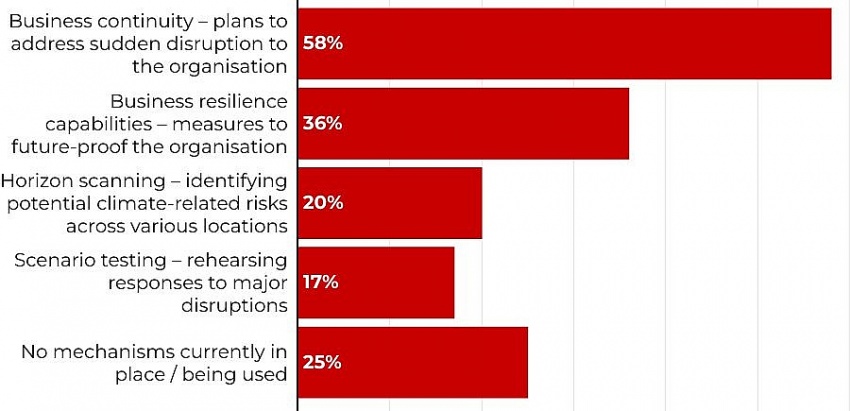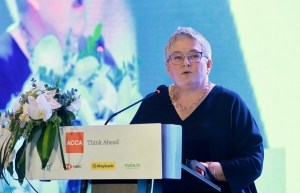ACCA urges businesses to prioritise climate resilience as COP29 summit opens
As the COP29 climate summit kicks off in Azerbaijan, alarming new research from ACCA reveals that just 20 per cent of businesses and other organisations surveyed identified climate-related risks across their operations.
The report, which surveyed over 600 finance professionals globally, paints a sobering picture of the lack of preparedness amid escalating environmental threats.
“Businesses and other organisations are not prepared for weather-related disasters, with out-of-date business continuity plans failing to reflect the frequency of disruption of climate-related events,” according to the report.
 |
| Figures from the ACCA report. Photo: ACCA |
While climate disruptions such as extreme floods, hurricanes, and rising temperatures are becoming more frequent and severe, only 17 per cent of organisations rehearse their response to major climate-related disruptions, and a staggering 25 per cent have no resilience-building measures in place at all.
“Spain's recent floods and intensifying hurricanes worldwide are harrowing reminders that climate change is not a distant threat; it’s reshaping lives and communities right now,” said report author Emmeline Skelton, head of sustainability at ACCA. “Organisations must make climate adaptation a priority, not only to safeguard their operations but to protect the people and places at risk. Rising temperatures, more intense rainfall, and swelling sea levels make the evidence unmistakable, we must act now to build resilience and mitigate further harm.”
The escalating environmental threats demand comprehensive preparation. Yet, the ACCA survey reveals that climate adaptation planning is still not receiving the urgent attention it requires. “It’s time for organisations to take decisive action to protect both their future and the communities they serve,” Skelton stated.
However, resilience is not a priority for organisations, with two-thirds of respondents not investing adequately to address the physical risks posed by climate change, and only 37 per cent planning to increase spending in this area.
“Organisations with a digital-first approach can’t overlook climate risks affecting their remote workforce,” she added. “To ensure resilience, forward-thinking organisations need to proactively support remote workers with measures like power backups and health monitoring to stay prepared in an increasingly unpredictable climate.”
The report also highlights regional disparities in climate-related risks. In Africa, power outages emerged as the most significant disruption, impacting 54 per cent of respondents. In North America, concerns were more centred on supply chain breakdowns (41 per cent) and employee health impacts (39 per cent).
Meanwhile, digital-first organisations face unique challenges, particularly for remote workforces. These vulnerabilities demand innovative solutions, such as power backups and enhanced health monitoring systems, to ensure continuity in the face of extreme weather events.
According to the report, CFOs and finance teams are essential to building climate resilience through risk-based planning and sustainable business strategies. By championing transparency in emissions targets and transition plans, finance professionals play a critical role in reducing carbon footprints and advancing net-zero goals, ultimately supporting a fair, inclusive, and climate-resilient future.
ACCA will be sharing the findings of this report, and other research and guidance it has produced on a range of sustainability issues, at the COP29 climate summit in Azerbaijan. The report includes tool kits for finance teams to build resilience skills in areas such as scenario testing, crisis management planning, and business continuity plans. It also lists key actions business and governments must take to build resilience and address climate-related risks.
 | ACCA Asia Pacific Dialogue raises conversations on a sustainable future The ACCA Asia Pacific Dialogue 2024 held in Hanoi on May 28-29 aims to foster a platform for innovative thinking and strategic dialogue among key stakeholders in the accounting and finance sector, focusing on sustainable finance, digital transformation, and regulatory developments, reflecting the most pressing trends and challenges in the region. |
 | State Audit Office of Vietnam and ACCA strengthen partnership for sustainable development The meeting between the State Audit Office of Vietnam (SAV) and the Association of Chartered Certified Accountants (ACCA) on October 7 marks a pivotal step in strengthening their practical partnership, while offering an opportunity to explore expanding collaboration in the financial sector to support economic growth and national prosperity in Vietnam. |
 | ACCA supports SMEs in meeting sustainability reporting standards At VIR's sustainable development conference on November 12, To Quoc Hung, country manager at ACCA Vietnam, committed to supporting the development of a green workforce in driving the green-digital transition within small- and medium-sized enterprises in Vietnam. |
What the stars mean:
★ Poor ★ ★ Promising ★★★ Good ★★★★ Very good ★★★★★ Exceptional
Related Contents
Latest News
More News
- $100 million initiative launched to protect forests and boost rural incomes (January 30, 2026 | 15:18)
- Trung Nam-Sideros River consortium wins bid for LNG venture (January 30, 2026 | 11:16)
- Vietnam moves towards market-based fuel management with E10 rollout (January 30, 2026 | 11:10)
- Envision Energy, REE Group partner on 128MW wind projects (January 30, 2026 | 10:58)
- Vingroup consults on carbon credits for electric vehicle charging network (January 28, 2026 | 11:04)
- Bac Ai Pumped Storage Hydropower Plant to enter peak construction phase (January 27, 2026 | 08:00)
- ASEAN could scale up sustainable aviation fuel by 2050 (January 24, 2026 | 10:19)
- 64,000 hectares of sea allocated for offshore wind surveys (January 22, 2026 | 20:23)
- EVN secures financing for Quang Trach II LNG power plant (January 17, 2026 | 15:55)
- PC1 teams up with DENZAI on regional wind projects (January 16, 2026 | 21:18)

 Tag:
Tag:




















 Mobile Version
Mobile Version